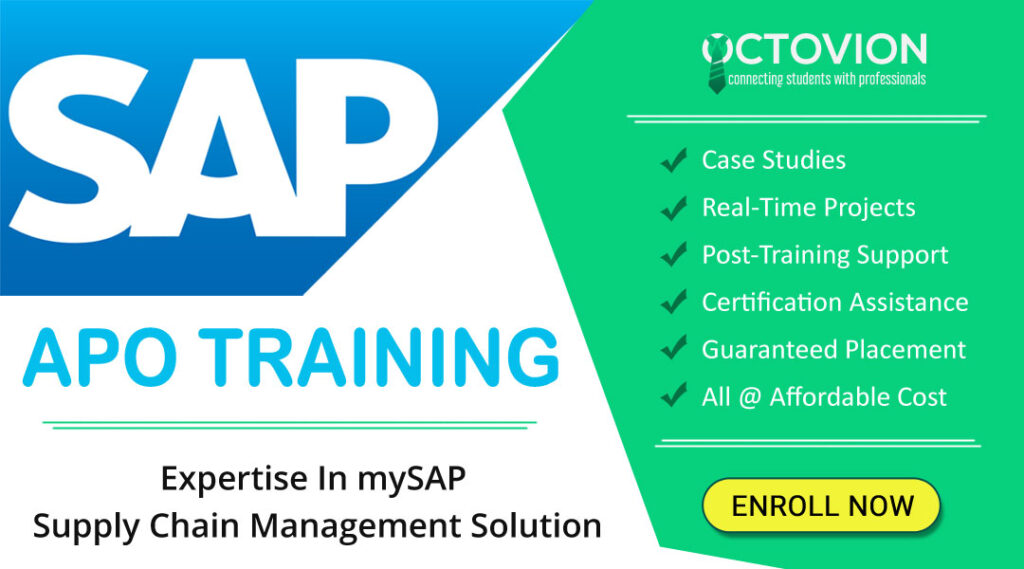I am a Certified SAP-PP consultant with 3.5 years of SAP experience and 6 years of domain experience. I also have experience in QM and PM modules. I want to pursue a career in SAP-APO and do a certification, But before that, I have a few queries.
Should I pursue a career in SAP-APO is the first and foremost question?
Once I complete the training, what would be my job prospects in SAP APO?
Do Companies recruit freshers? Will I have to start as a fresher in SAP APO?
Considering the above background as a Certified SAP-PP consultant with extensive experience in SAP and domain knowledge spanning over six years, transitioning to a career in SAP-APO (Advanced Planning and Optimization) could be a lucrative move. SAP-APO is a specialized module within the SAP ecosystem that focuses on supply chain planning, demand planning, production planning, and optimization processes.
Table of Contents
What is SAP APO? Which industries use it
SAP APO, which stands for Advanced Planning and Optimization, is a software solution developed by SAP SE, a leading provider of enterprise application software. SAP APO is utilized for supply chain management and optimization purposes. It offers a suite of tools and functionalities designed to streamline various aspects of the supply chain, including demand planning, supply network planning, production, scheduling, inventory optimization, and transportation planning.
Organizations across manufacturing, retail, consumer goods, pharmaceuticals, and automotive industries use SAP APO to enhance operational efficiency, reduce costs, and improve customer service. By leveraging SAP APO, businesses can better forecast demand, optimize inventory levels, synchronize production schedules with customer demand, and streamline logistics and transportation processes. SAP APO helps companies achieve greater visibility and control over their supply chain operations, enabling them to respond more effectively to market and customer needs.
Is pursuing a career in SAP-APO worthwhile?
Given the existing expertise in SAP and related domains like QM and PM, delving into SAP-APO could be a logical progression. As supply chain management becomes increasingly complex, companies seek professionals skilled in advanced planning and optimization techniques to streamline operations and enhance efficiency. By obtaining certification in SAP-APO, you’ll position yourself as an expert in demand and supply chain planning, highly valued in various industries.
Job prospects after completing SAP-APO training
Upon completing SAP-APO training and obtaining certification, your job prospects will likely be promising. Manufacturing, retail, logistics, and consumer goods companies use SAP-APO to optimize their supply chain processes. 42% of SAP APO customers are in the United States, 7% are in India, 6% are in Germany, and 5% are in the United Kingdom.
With your SAP background and domain experience, you’ll be equipped to take on roles such as SAP-APO consultant, supply chain analyst, demand planner, or production planner on completing SAP APO online training. These roles often come with attractive salary packages and opportunities for career advancement.
1. SAP-APO Consultant: As an SAP-APO consultant, you’ll implement, configure, and optimize SAP-APO solutions to meet clients’ specific needs. This role involves collaborating with cross-functional teams to design and implement supply chain planning strategies.
2. Supply Chain Analyst: Analysts leverage SAP-APO to analyze supply chain data, identify trends, and make data-driven decisions to optimize inventory levels, production schedules, and distribution processes. This role requires strong analytical skills and a deep understanding of supply chain dynamics.
3. Demand Planner: Demand planners use SAP-APO to forecast customer demand, develop demand plans, and optimize inventory levels. They collaborate with sales, marketing, and production teams to ensure alignment between forecasted demand and production capacity.
4. Production Planner: Production planners utilize SAP-APO to create production schedules, allocate resources, and optimize manufacturing processes. They work closely with production teams to ensure efficient resource use and timely customer delivery.
5. Logistics Coordinator: Logistics coordinators manage the transportation, warehousing, and distribution of goods using SAP-APO to optimize logistics processes. They oversee inventory management, monitor shipment schedules, and coordinate with suppliers and carriers to ensure timely delivery of goods.
6. Supply Chain Manager: Supply chain managers oversee end-to-end supply chain operations, including procurement, production, and distribution. They leverage SAP-APO to develop strategic supply chain plans, optimize processes, and drive continuous improvement initiatives.
As for the current scenario of SAP-APO in the USA, it’s important to note that SAP has been transitioning its planning and optimization capabilities to the SAP Integrated Business Planning (IBP) platform, which offers advanced functionalities and cloud-based solutions.
Summing Up
While many organizations continue to use SAP-APO, there is a growing demand for professionals skilled in SAP IBP as companies migrate to more modern and integrated planning systems. Therefore, staying updated with the latest SAP technologies and acquiring expertise in SAP IBP alongside SAP-APO could further enhance your career prospects in the USA.
You can explore platforms like LinkedIn, SAP community forums, or industry-specific websites for insights shared by professionals working in the field. Additionally, contacting your professional network or attending SAP-APO conferences and seminars could provide valuable insights into the job market and career opportunities.
While some companies may prefer candidates with prior experience in SAP-APO, there are opportunities for freshers, especially if you demonstrate a strong understanding of supply chain concepts and proficiency in SAP tools. A background as a Certified SAP-PP consultant and domain experience could set you apart from other candidates, making you an attractive prospect for employers seeking entry-level or mid-level SAP-APO positions. Now if you are looking for a good SAP APO course with assured placements, you are at the right place.

If you need further assistance, don’t hesitate to call us at +1 (908) 617-0009 or email us at info@octovion.com. We’re here to help!
Image Credit: Freepik.com



